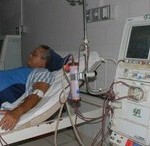By Dayamis Sotolongo Rojas

Even if a program for organs transplant and donation is already established in Sancti Spiritus, central Cuba, only kidney and cornea donations are made in the province, the latter being less frequent, carrying out only three as for 2011, which have benefitted four patients.
There is an alien kidney in Luisa Maria’s body. She didnot get to know the name of the person leaving her an unexpected inheritance: salvation. Since she was diagnosed with acute renal failure, all hope was gone and her name added to the long transplant waiting list.
“I was basically ready for hemodialysis when I was briefed on the possibility of getting a donation. I was happy because of my health but also sad for the pain caused to others. It’s something really hard but I will be eternally grateful to the donor”.
Similar histories repeat everywhere, in most of the cases anonymously; perhaps by someone who in the point of death knows how to be useful for the other.
To die: to secure other’s life? Medical and ethical conflict? Respect for the patient’s will or the family says the last word?
THE WAITING LIST
Not only dead people can become organs donors; modern medicine also experiments with donors alive, who might be blood-related to receivers, or show a high matching level after several studies even if there is no familiar bond.
Even if a program for organs transplant and donation is already established in Sancti Spiritus, central Cuba, only kidney and cornea donations are made in the province, the latter being less frequent, carrying out only three as for 2011, which have benefitted four patients.
Nurse Ivette Lorenzo Cordova, coordinator for the Department of Organ Transplant and Donation in the Camilo Cienfuegos Hospital, explains that every surgery involves a multidisciplinary team integrated by surgeons, anesthesiologists, nephrologists, urologists and nurses prepared to take the organs out. In the specific case of mono-organic donations these are carried out by the specialists in the territory but, if they are multi-organic, staff from Havana is required.
“Each donation is a timed surgery, as in the case of the heart, for instance, which is to be carried out in a three hour period. But these requirements are not only of the organ’s extraction but also for its transport, needing also extreme caution to preserve it, as in most of the experiences the receiver is already waiting for the transplant”.
Although several pathologies are tributary of transplants, the greatest number of receivers in Sancti Spiritus province suffers from acute renal failure. Around 20 people appeared on the waiting lists taken into account at national levels.
“The inclusion on the list is not at random, said nephrologist Remberto Cruz Perez. Different exams are made in a month to determine whether the patient is tributary or nor of a transplant”.
It is not about a constant surveillance of death; those living with her try everything to fight her, but they have learned somehow to get rid of prejudices, and they look at it as the beginning of a cure and not as its end.
BETWEEN WILL AND DUTY
With only 16 years old, Cubans give a legal connotation to their ages and when writing their signature in their future IDs most of them did not even look at the blank space left for donors. The positive answer to that “question” denotes the majority of time, a mere formality which does not take into account the benefits of a human act.
“The most difficult part is to convince the families of the need of a donation. Everyone wants to preserve their relatives till the end, and almost no one sees death from the scientific point of view. In our specific case, we don’t practice euthanasia, and as for patients suffering brain death, for instance, it’s a tough moment for the family to make up their minds”, adds Ivette Lorenzo.
As human beings, just a few agreed to mutilate the body of a deceased, even aware that it could help save others. No matter if people clearly states on their IDs that they accept to be donors; if the families refuse so in the time of death, the legal form is not taken into account.
“This year we had such a situation; even if the person was tributary of a donation, this could not be carried out because family consent was not given”, affirmed Lorenzo Cordova.
As times have gone by, death has not lost its myth. In modern days, however, science is in constant search of new methods to heal or better up people’s quality of life, that’s why not a single resource can be dispensable. Giving others part of us is not only altruism; it can be regarded as the only way of giving life to death.
Translated by Escambray
 Escambray ENGLISH EDITION
Escambray ENGLISH EDITION





Escambray reserves the right to publish comments.